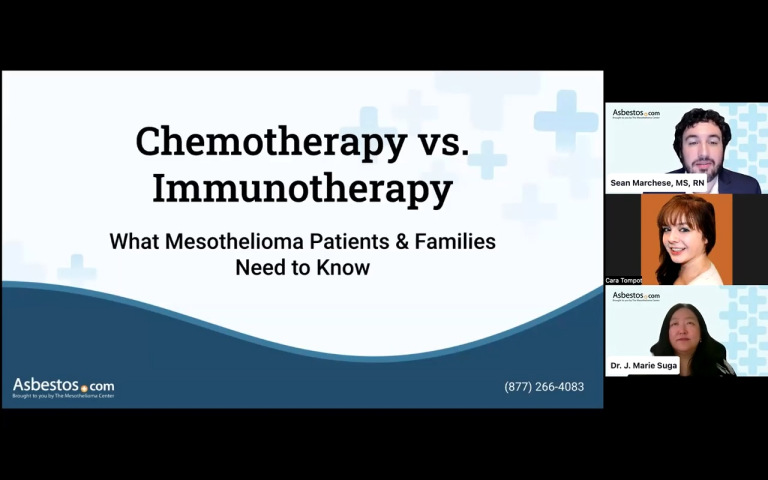
Carboplatin
Doctors prescribe the chemotherapy drug carboplatin to treat a variety of cancers, including mesothelioma as a second-line treatment. It's more physically tolerable than stronger chemotherapy drugs, such as cisplatin, and it results in less severe side effects.

What Is Carboplatin?
Carboplatin is a chemotherapy drug that can help treat certain types of cancer, such as head and neck, ovarian and lung cancers. It also treats mesothelioma, a rare cancer primarily caused by asbestos exposure. Carboplatin enters cancer cells and attaches itself to DNA. This action blocks the cell from dividing or working properly. It stops the cell from growing and eventually kills it.
Chemotherapeutic drugs are special medicines used to fight cancer cells, which grow quickly and form tumors. The chemotherapy drug cisplatin is the “parent” drug of carboplatin. Both cisplatin and carboplatin contain platinum, which helps them bond to DNA.
Carboplatin is safe, it’s effective, it’s tolerable, and it has a similar progression-free survival and overall survival [in pleural mesothelioma]. Thus, we don’t see any obvious reason to choose cisplatin over carboplatin in the real-world clinic setting.
Carboplatin is often combined with Alimta (pemetrexed) to enhance its effectiveness against mesothelioma. It may also be combined with other chemotherapy drugs, such as Gemzar (gemcitabine) and doxorubicin. Research shows mesothelioma survival with carboplatin combination chemotherapy ranges from about 13 to 15 months.
Carboplatin Information
Researchers developed this cancer medicine in the late 1980s. Doctors like it because while chemotherapy drugs cause side effects in other quickly growing cells, such as hair and skin cells, carboplatin is known to cause fewer side effects compared to other chemotherapy drugs.
| Brand Name | Paraplatin |
| Alternate Names | Carboplatin, Carboplatinum |
| Manufacturer | Pfizer |
| Dosage | AUC 5 every three weeks |
| Administration Route | Intravenous |
| Active Ingredient | Carboplatin |
| Drug Class | Antineoplastic alkylating agent |
| Medical Code | J9045 |
| Interacting Drug | Docetaxel, paclitaxel, aminoglycoside antibiotics, leflunomide, natalizumab, pimecrolimus, topotecan, trastuzumab |
| Related Drug | Bone marrow suppression, anemia, vomiting, anaphylactic-like reactions, fetal toxicity |
| Medical Studies | Study of Nivolumab Combined with Ipilimumab Versus Pemetrexed and Cisplatin or Carboplatin as First Line Therapy in Unrescetable Pleural Mesothelioma Patients (CheckMate743) |
| FDA Warning | Bone marrow suppression, anemia, vomiting, anaphylactic-like reactions, fetal toxicity |
Unlike other chemotherapy drugs, doctors dose carboplatin based on projected total body exposure. They use a calculated measurement called “area under the curve” that accounts for a patient’s ability to clear the drug from the body. This approach helps prevent toxicity and side effects.
When used with Alimta (pemetrexed), carboplatin is considered one of the gold-standard treatments for mesothelioma. Your doctor may suggest carboplatin over cisplatin because of fewer side effects and less toxicity to kidney function. In addition, many studies suggest similar results compared to carboplatin.

Carboplatin Treatment for Asbestos-Related Cancers
Carboplatin chemotherapy is a treatment for mesothelioma and the other 3 types of asbestos-related cancer: Lung cancer, ovarian cancer and laryngeal cancer. It’s usually done at a hospital or treatment center on an outpatient basis. The medicine is given through a vein in the arm about once every 21 days. Sometimes, a patient may have to stay in the hospital.
Carboplatin is an effective form of chemotherapy for mesothelioma. It extends survival and reduces symptoms, including difficulty breathing and chest pain.
Carboplatin for Mesothelioma
My oncologist agreed that I was suffering the side effects and decided to change the cisplatin part of the chemo to carboplatin. This mixture was a lot easier on my system.
The U.S. Food and Drug Administration hasn’t approved carboplatin for treating mesothelioma, but it’s used when patients can’t tolerate cisplatin. Although carboplatin has been used to treat all 4 types of mesothelioma, most published research has focused on pleural and peritoneal, the 2 most common types.
Carboplatin may not be the first drug of choice for mesothelioma. It’s an effective one that is well suited for those who don’t tolerate or can’t receive cisplatin. The response rates and survival rates are comparable to cisplatin, with the added benefit of causing less severe side effects.
Carboplatin for Pleural Mesothelioma
Published studies have shown carboplatin, in combination with Alimta or Gemzar, has helped pleural patients who don’t qualify for surgery live an average of 12.7 to 16.5 months. It’s been used in systemic and heated intrapleural chemotherapy and studied in combination with Tumor-Treating Fields.
Many studies use carboplatin when mesothelioma patients can’t tolerate cisplatin, and the results get lumped together, making it difficult to find data only about carboplatin. Decades of use have proven its efficacy in extending survival while causing fewer side effects than other chemotherapy drugs.
Carboplatin for Peritoneal Mesothelioma & HIPEC
Carboplatin has been used to treat peritoneal mesothelioma both systemically and after surgery as heated intraperitoneal chemotherapy. Studies show that carboplatin produces similar survival results to cisplatin in these settings.
HIPEC with carboplatin in diffuse malignant peritoneal mesothelioma is associated with improved overall survival and shorter hospital stay compared with HIPEC with mitomycin.
A case report from 2006, which has been referenced recently in new studies, showed complete remission of advanced peritoneal mesothelioma tumors using systemic chemotherapy with carboplatin and Taxol following intraperitoneal infusion with cisplatin. The original study authors noted, “After the sixth course, a complete remission was observed. …Our case suggests that we could improve the prognosis of malignant mesothelioma by aggressive chemotherapy.”
Carboplatin for Asbestos-Related Lung Cancer
The FDA has approved carboplatin in combination with other drugs for the treatment of lung cancer. For example, carboplatin, Taxol (paclitaxel) and Tecentriq (atezolizumab) is an approved first-line treatment for advanced non-squamous non-small cell lung cancer.
Carboplatin with pemetrexed and the immunotherapy drug Rybrevant (amivantamab) is approved for patients with NSCLC who have a type of mutation in the EGFR protein. The FDA also approved Imfinzi (durvalumab), etoposide and carboplatin to treat advanced small-cell lung cancer.
Carboplatin for Asbestos-Related Ovarian Cancer
The FDA has approved carboplatin to treat ovarian cancer, which is associated with exposure to asbestos-contaminated talc. It may be given alone but is more effective in combination with other chemotherapy drugs, including Taxol and Gemzar.
Research shows the median overall survival with carboplatin and Taxol, the standard combination for ovarian cases, is 54.8 months. The FDA also approved carboplatin, Taxol and Avastin (bevacizumab) for advanced epithelial ovarian cancer.
Carboplatin for Asbestos-Related Laryngeal Cancer
Doctors use carboplatin alone or in combination with radiation or other chemotherapy drugs in the treatment of laryngeal cancer. A 2022 study reported a 3-year survival rate of 58% using carboplatin, Taxol and radiation to treat advanced cases.
For laryngeal cancer patients who can’t tolerate high-dose cisplatin, doctors may use carboplatin and concurrent radiation therapy. This combination is associated with a 49% 5-year survival rate among late-stage laryngeal cancer patients, according to a 2018 study published in the American Journal of Clinical Oncology.

Side Effects of Carboplatin
Side effects of carboplatin are less severe than those of other chemotherapeutic agents. Patients taking this medication can still expect to experience some side effects. A cancer doctor may be able to prescribe medication to help alleviate certain side effects such as nausea, vomiting and loss of appetite.
Carboplatin Side Effects
- Constipation
- Damaged vision or hearing
- Fatigue or feelings of weakness
- Hair loss
- Impaired immune function
- Increased tendency for bruising or bleeding from poor clotting
- Loss of appetite
- Nausea and vomiting
- Stomach pain
Those treated with carboplatin for mesothelioma cancer typically experience reduced immune system function and become more prone to infection. Even a cold may harm a patient receiving this treatment, so anyone receiving treatment with carboplatin should avoid contact with people with infections or who are ill.
Serious Side Effects
A potentially serious side effect is kidney damage, which your doctor will monitor for. Carboplatin should be used with caution in individuals with kidney disease. It could worsen kidney function and increase the risk of carboplatin toxicity.
Serious Side Effects of Carboplatin
- Black, tarry stools
- Chills
- Dizziness or feeling of faintness
- Fever
- Rash
- Red urine
- Shortness of breath or wheezing
- Swelling of the feet or ankles
Like most chemotherapy drugs, carboplatin is harmful to unborn babies. Thus, women who are pregnant or breastfeeding shouldn’t use it.
To avoid potentially life-threatening complications, anyone who is taking carboplatin should seek medical advice if they contract any infection or experience fever, chills, rash or sore throat. The appearance of any side effects, whether mild or serious, should be discussed with a doctor as soon as they arise.
Christine underwent 6 courses of chemotherapy using cisplatin and Alimta, which had shrunk the cancer. “I had had enough by then and was ready to throw the towel in,” Christine said. “But when the oncologist said it had visibly shrunk, I thought it [the chemo] could shrink it even further if I carried on with it.” Her doctor suggested they switch cisplatin for carboplatin to reduce the severe side effects she was experiencing.
Carboplatin Research in Mesothelioma Treatment
A phase III clinical trial that combined carboplatin, Alimta, Avastin and Tecentriq (atezolizumab) published results in 2024 in the Journal of Clinical Oncology. It found the combination treatment improved survival in pleural mesothelioma patients with the sarcomatoid cell type.
A 2024 test-tube study published in Nucleosides, Nucleotides, and Nucleic Acids looked at blocking the enzyme lactate dehydrogenase. The study found blocking the enzyme didn’t improve the effects of gemcitabine and carboplatin chemotherapy against either pleural or peritoneal mesothelioma cells.
I’ve never had a bad experience with chemotherapy. Part of that is I take a steroid that gives me 48 hours of protection from nausea and it works like a charm. My worst case on a scale of 1 to 10 has probably been a 3.
While relatively little research on carboplatin for mesothelioma has been conducted in the last decade, prior studies have proven its effectiveness against mesothelioma. Early research on carboplatin for mesothelioma found it practically as effective as cisplatin but with fewer side effects.
For example, a 2008 phase III found about 63% of the people in the cisplatin group and 64% of those in the carboplatin group were still alive after a year. A 2006 phase II trial reported carboplatin and pemetrexed produced results similar to the FDA-approved combination of cisplatin and pemetrexed but with fewer side effects.
Recommended Reading








